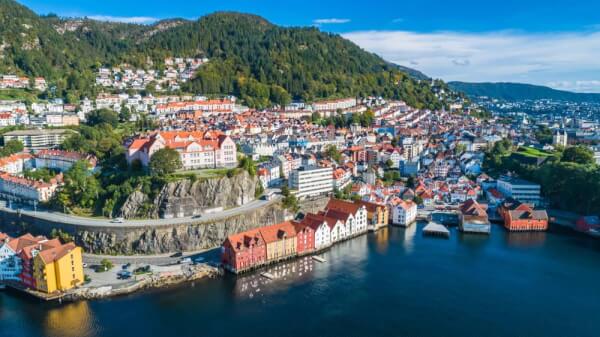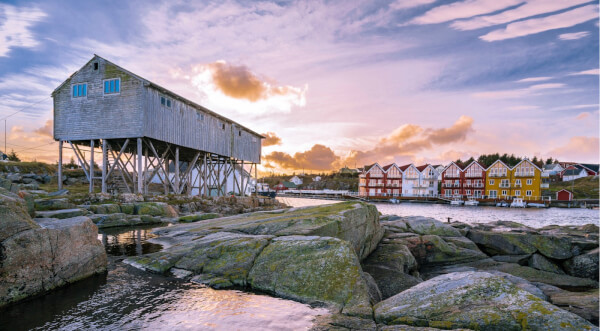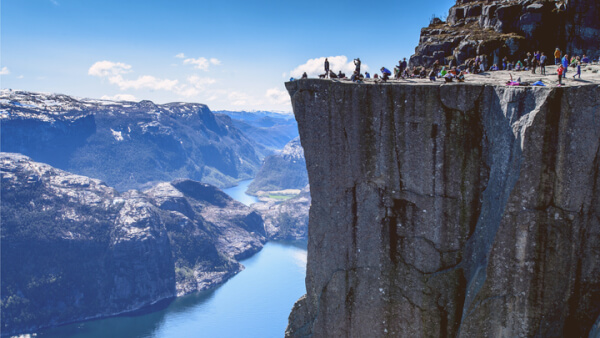How to order from Amazon in Norway
Planning a visit to the land of fjords and Northern Lights, or perhaps you're already a resident of Norway? Whether you're an expat or a local, thinking about...

Considering a move to Norway from the UK? It’s easy to see why, as the country is regularly featured in lists of the world’s happiest places to live.
Whether you’re moving there for work, study, exploration, retirement or another reason, you’ll want to know what you’re getting yourself into.
Read on to find out the pros and cons of living in Norway, which may help you make your decision.
And if you want an easy way to manage your money in Norwegian kroner, check out the Wise account from the money services provider Wise. It’s not a bank account but offers some similar features, and your money is safeguarded.
Over 12.8 million people worldwide use Wise to send, spend, hold and convert money in 40+ currencies – for low, transparent fees* and no-markup exchange rates close to what you can see on Google.
➡️ Learn more about the Wise account
Let’s start with an at-a-glance look at the main reasons to move to Norway, along with some of the potential downsides.
| Pros | Cons |
|---|---|
| High standard of living | High cost of living |
| Stunning natural scenery | Extreme weather and dark winters |
| High quality homes | Highly competitive job market |
| It’s easy to start a business | Different social norms |
| Low crime | |
| Universal healthcare | |
| World-leading education | |
| Open and inclusive culture | |
| Efficient and secure banking system |
Here are some of the many reasons UK expats move to Norway:
Norway and many of its Scandinavian neighbours are famous for their high standard of living. These countries regularly feature at the top of the World Happiness Index, which in 2024 put Norway at number 7.¹
Countries in the top 10 perform extremely highly in areas such as life expectancy, freedom, social support and the generosity and kindness of its people.
Norway is absolutely beautiful. From its rugged coastlines to its jagged mountain peaks, the scenery will take your breath away over and over again.
And when the surroundings look that good, people tend to take advantage of them, so outdoor culture is huge in Norway. You’ll find hiking, biking, fishing, boating and more - everything an outdoorsy person could dream of can be found in Norway.
It’s also good to know that the country takes environmental protection seriously. Recycling is a part of daily life, many areas and national parks are protected, and the government has set ambitious low emissions targets as part of its Climate Act.
Norwegians take a lot of pride in their homes, and that means they tend to be well built, clean and well cared for.
Plus, they have that minimalist, ‘hygge’ inspired Scandinavian decor that always seems to be on trend. Many rental properties come furnished, and some homes look like they were pulled straight from the pages of an IKEA catalog.
Norway is a global leader in industries ranging from maritime and energy to technology and communications. And the country’s administration actively encourages and supports new businesses, leading to over 43,000 new businesses being registered in the country in 2023.²
So if you want to start a business in Norway, you’ll find the process to be pretty streamlined and straightforward.
Generally, crime in Norway is very low. It’s safe to walk places by yourself, as violent crime is quite rare. Of course, there will always be a difference between living in a big city like Oslo and a smaller town in the countryside.
Norway’s universal healthcare system is similar to the UK’s National Health Service (NHS) in many ways. The country’s residents don’t have to pay out of pocket for visits to the doctor, but there are still some costs for patients, such as prescriptions.
Norway really considers education to be important, and it shows in the quality of the system.
The country is known for having one of the world’s best education systems, with free, world class public education for children.
Higher education at the country’s high-ranking universities used to be free for non-residents too, but tuition fees for students from outside the EU/EEA (which includes the UK) were introduced in the 2023/24 academic year.³
Norway is known for its progressive values and strong emphasis on equality, as well as being one of the most LGBTQ+-friendly countries in the world. This means that people from all backgrounds are welcome there.
If you’re looking to open a bank account in Norway (and it’ll definitely be useful) - it’s good to know that Norway has one of the most advanced and secure banking systems in the world.
Opening a bank account is relatively straightforward for residents. And once set up, most transactions can be handled online or via mobile apps. Norway’s strong financial regulations also mean your money is well-protected, and fraudulent activity is rare.
You can also check out non-bank alternatives, like the Wise account, to manage your money in Norway.

Of course, not everything about Norway is perfect. The country has its drawbacks, and they need to be taken into consideration too, if you’re thinking about a move there.
The good news though is that when it comes to pros and cons, Norway tends to have more advantages than downsides.
Let’s take a look at the handful of cons of living in Norway:
The high quality of life that Norwegians enjoy comes with a big price tag. Rents and home prices in Norway are extremely expensive.
The cost of food is also high, especially if you’re dining out. So if you don’t like to cook at home, you may need to take a good, long look at your budget to see if you can afford to live in Norway.
Overall, the cost of living in Norway (excluding rent) is about 15.8% higher than the UK.⁴ It will depend though on where in the country you’re living, and where in the UK you’ve moved from.
Norway is really far north. That means it’s extremely cold there for most of the year. Even summer temperatures aren’t that high, and months of winter wind, snow, ice and rain, can be hard to handle.
And in northern parts of the country in winter, there’s hardly any daylight at all between November and January. This can also be difficult to cope with if you’re not used to it, although it can also add to the beauty of Norway’s already stunning natural landscapes.
While Norway offers excellent working conditions, landing a job - especially as a foreigner - can be challenging. One of the main hurdles is the language barrier.
While English is widely spoken in Norway, many jobs require fluency in the local language. Norwegian apparently isn’t too difficult for English speakers to learn, but it will inevitably take time.
You may also lack the relevant local experience of other applicants. There’s also the fact that the country has a highly skilled and highly educated workforce. All of these factors can make the job market particularly tough for newcomers.
While not every UK expat experiences this, some have found that the social culture in Norway can be difficult to get used to.
Norwegians certainly aren’t unfriendly, but they tend to be reluctant to speak to strangers and have a high regard for personal space. This can make it difficult for newcomers to make friends and build a personal network, especially if they’re not living near other UK expats.
| 💰 Currency | Norwegian krone (NOK) |
|---|---|
| 🏛️ Capital city | Oslo |
| 🗣️ Main language | Norwegian (Bokmål and Nynorsk) |
| 👥 Population | Approx. 5,623,000⁵ |
| 📊 No. of British expats | Approx. 13,300⁶ |
For British expats, the best places to live in Norway tend to be the bigger cities of Oslo, Bergen and Stavanger.
This is where you’ll find the most job opportunities, access to shops, restaurants and amenities, expat communities and a wider range of social and cultural activities.
Yes, Norway is generally considered to be a safe place both to visit and to live.
Crime levels are low, although the UK Government’s Foreign, Commonwealth & Development Office (FCDO) warns about a small risk of petty theft at airports and railway stations in and around Oslo. It also states that terrorist attacks in Norway cannot be ruled out.⁷
Sources used:
Sources last checked on date: 24-Apr-2025
*Please see terms of use and product availability for your region or visit Wise fees and pricing for the most up to date pricing and fee information.
This publication is provided for general information purposes and does not constitute legal, tax or other professional advice from Wise Payments Limited or its subsidiaries and its affiliates, and it is not intended as a substitute for obtaining advice from a financial advisor or any other professional.
We make no representations, warranties or guarantees, whether expressed or implied, that the content in the publication is accurate, complete or up to date.

Planning a visit to the land of fjords and Northern Lights, or perhaps you're already a resident of Norway? Whether you're an expat or a local, thinking about...

Everything you need to know about moving to Norway from the UK, including visas, cost of living, property and more.

Cost of living in Norway varies from region to region. This guide outlines what you can expect in terms of living costs.

Norway is a fantastic destination if you’re an expat looking to live and work abroad somewhere with friendly people, an interesting heritage, and awesome...

Sometimes hailed as “the most liveable place on earth,” Norway is often coveted for it’s beautiful natural landscape, attracting hundreds of thousands of...

Almost 14% of the total population of Norway are immigrants, with one third travelling to Norway specifically to find work. Despite the notoriously high taxes...